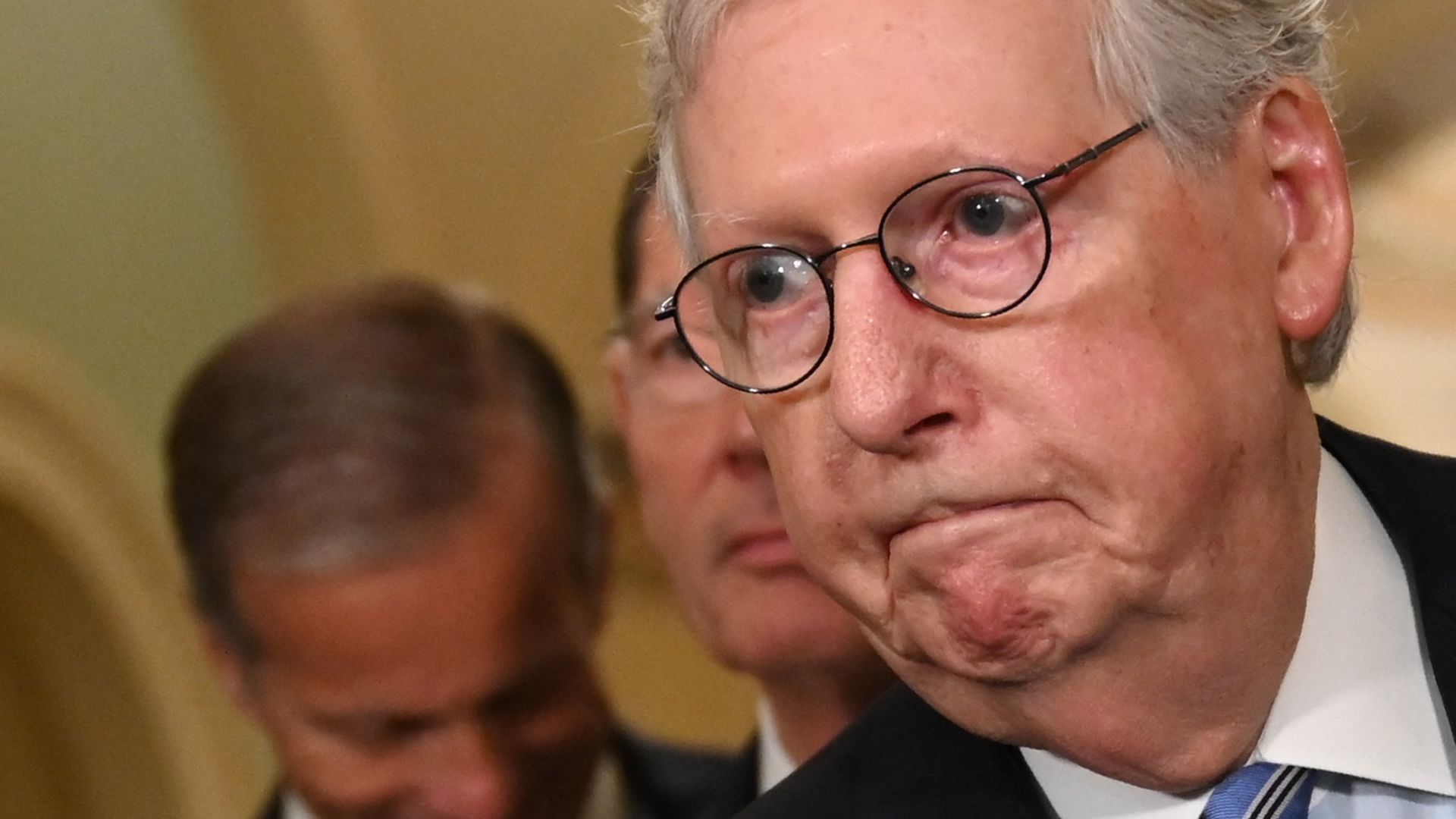McConnell blinks
Add Axios as your preferred source to
see more of our stories on Google.

Photo: Jim Watson/AFP via Getty Images
Senate Minority Leader Mitch McConnell (R-Ky.) blinked.
Why it matters: After McConnell refused for months to budge over his insistence that Democrats suspend the debt limit through the budget reconciliation process, he tried to forestall changes to the filibuster by offering Democrats an alternate route to temporarily raise the debt limit through December.
Behind the scenes: McConnell's decision was in large part driven by Democrats' fresh calls to go nuclear and modify the filibuster — which requires 60 votes to move on major legislation — as they sought to break the debt-limit impasse.
- "The paramount concern here is saving the 60-vote rule, saving the filibuster," a Republican senator told Axios.
- "If you compare the debt ceiling, which is raised frequently, to permanently changing the Senate as an institution, it's not even a close call," the senator added.
What we're hearing: Democrats seem to be leaning toward taking the deal, according to Axios' conversations with senior leadership aides.
- Democratic leaders also delayed Wednesday's scheduled cloture vote on the House-passed bill to suspend the debt limit through December 2022.
- A Schumer aide told Axios "it appears the two sides are nearing an agreement, but the conversations about specifics are ongoing and neither leader has formally said anything, so ..."
- "Either option will provide the Democrats who control Washington with even more time to pass standalone debt limit legislation through reconciliation," a Republican leadership aide said. "These are reasonable paths to avoid default."
- If both sides accept the deal, they'd create more uncertainty at the end of the year. Government funding is also set to expire in December without renewed action.
The big picture: Democrats are already previewing how they'll use the messaging in their favor, while their Republican counterparts are keeping mum.
- “McConnell caved,” Sen. Elizabeth Warren (D-Mass.) told reporters. “And now we're going to spend our time doing child care, health care and fighting climate change.”
- Several Republican senators, including Sens. Pat Toomey (R-Pa.), Josh Hawley (R-Mo.) and Marco Rubio (R-Fla.), refused to comment on McConnell's offer and whether they'd support a short-term debt ceiling increase.
- They told Axios they wanted to see where the negotiations led before weighing in.
The Republican senators also dodged questions about whether they were frustrated with McConnell's approach.
- Former President Trump, however, was quick to criticize McConnell: “Looks like Mitch McConnell is folding to the Democrats, again," he said in a statement.
The details: McConnell's proposal included two options, which he laid out in a statement on Wednesday.
- One would allow Democrats to fast-track the suspension of the debt limit using the partisan budget reconciliation process.
- The other would raise the limit to a specified figure through December.
- Schumer has already declared that Democrats would not use reconciliation to raise the debt limit.
The backdrop: McConnell has been adamant about keeping the filibuster in place and succeeded in rallying the Senate Republican conference behind him.
- Earlier this year, he warned that his colleagues could not “even begin to imagine what a completely scorched-earth Senate” would look like without a filibuster.
What they’re saying: "We're working on a compromise so we can deal with the debt ceiling, so that we can be completely focused on getting the president's domestic agenda done," said Sen. Mazie Hirono (D-Hawaii).
- Asked if that means a short-term extension, she replied, "Probably."
- “I think changing filibuster rules is a much better path than this, but it’s no secret that it’s going to be hard to get consensus on that in such a short period of time,” said Sen. Chris Murphy (D-Conn.)
- Rep. Chip Roy (R-Texas) tweeted critically at McConnell, writing: "Uh ... voting for debt ceiling increase, short term or not, means you're buying it & associated policies ..."

